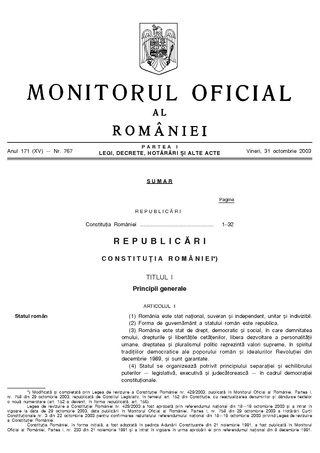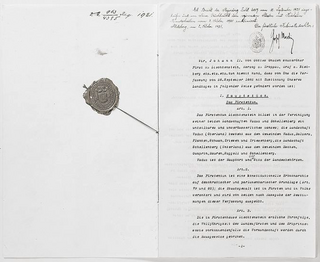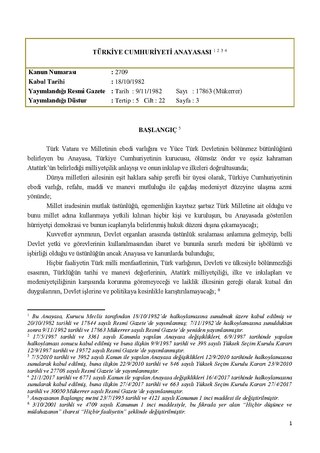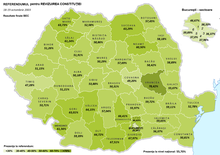
A popular initiative is a form of direct democracy by which a petition meeting certain hurdles can force a legal procedure on a proposition.

The Constitution of the Republic of China is the fifth and current constitution of the Republic of China (ROC), ratified by the Kuomintang during the Constituent National Assembly session on 25 December 1946, in Nanking, and adopted on 25 December 1947. The constitution, along with its Additional Articles, remains effective in ROC-controlled territories.
A constitutional amendment is a modification of the constitution of a polity, organization or other type of entity. Amendments are often interwoven into the relevant sections of an existing constitution, directly altering the text. Conversely, they can be appended to the constitution as supplemental additions, thus changing the frame of government without altering the existing text of the document.

The president of Romania is the head of state of Romania. They are directly elected by a two-round system, and, following a modification to the Romanian Constitution in 2003, serve for five years. An individual may serve two terms that may be consecutive. During their term in office, the president may not be a formal member of a political party. The president of Romania is the supreme commander of the Romanian Armed Forces.

Gagauzia or Gagauz-Yeri, officially the Autonomous Territorial Unit of Gagauzia (ATUG), is an autonomous territorial unit of Moldova. Its autonomy is intended for the local Gagauz people, a Turkic-speaking, primarily Orthodox Christian ethnic group.

The current Constitution of Romania is the seventh permanent constitution in modern Romania's history. It is the fundamental governing document of Romania that establishes the structure of its government, the rights and obligations of citizens, and its mode of passing laws. It stands as the basis of the legitimacy of the Romanian government. Adopted on 21 November 1991, it was approved on 8 December 1991 in a national referendum and promulgated on the same day.
Romania does not allow same-sex marriage or civil unions. Registered partnerships have been debated in the Parliament of Romania several times since 2008, though no bill on the matter has successfully passed. In May 2023, the European Court of Human Rights ruled that Romania was violating the European Convention on Human Rights by not recognizing same-sex unions. The government appealed the decision to the Grand Chamber in August 2023, but this appeal was rejected on 25 September 2023. Romania is now legally obliged to provide legal recognition to same-sex couples, and may risk financial sanctions from the Council of Europe if it fails to change the law.
Romania elects on a national level a head of state – the president – and a legislature. The president is elected for a five-year term by the people. The Romanian Parliament has two chambers. The Chamber of Deputies has currently 330 members, elected for a four-year term by party-list proportional representation on closed lists. The Senate has currently 136 members, elected for a four-year term by party-list proportional representation on closed lists.

The Constitution of the Republic of Belarus is the supreme basic law of Belarus. The Constitution is composed of a preamble and nine sections divided into 146 articles.

The Parliament of Romania is the national bicameral legislature of Romania, consisting of the Chamber of Deputies and the Senate. It meets at the Palace of the Parliament in Bucharest, the capital.

The Constitution of the Principality of Liechtenstein was promulgated on 5 October 1921, replacing the 1862 constitution.
The Constitution of North Dakota is the most basic legal document in the U.S. state of North Dakota. It consists of a preamble and fourteen articles.
Constitutional reform in the Philippines, colloquially known as charter change (cha-cha), refers to the political and legal processes needed to amend the current 1987 Constitution of the Philippines. Under the common interpretation of the Constitution, amendments can be proposed by one of three methods: a people's initiative, a constituent assembly or a constitutional convention.
Referendums in Taiwan at both the national and local level are governed by the Referendum Act of Taiwan, which was enacted by the Legislative Yuan in December 2003. Citizens can propose laws via referendums at the national and local levels. The Referendum Act also allowed people to make changes or abolish laws by referendums.

A nationwide referendum was held in Moldova on 5 September 2010 on whether or not the country should amend the Constitution of Moldova to return to direct popular election of the president. Since 2001, the president had been indirectly elected by Parliament, with a supermajority of 61 seats required for election. The voters are asked to answer the following question: "Would you agree with the Constitutional amendment, which would allow the election of the President of the Republic of Moldova by the entire population?" Voters chose one of the proposed options: "Yes (for)" or "No (against)". Of those who had cast their vote, 87.83% chose "Yes". However, the referendum did not pass because only 30.29% of voters turned out, short of the necessary 33% for the referendum to be considered valid.

The Constitution of Turkey, formally known as the Constitution of the Republic of Türkiye, and informally as the Constitution of 1982, is Turkey's fundamental law. It establishes the organization of the government, and sets out the principles and rules of the state's conduct along with its responsibilities in regards to its citizens. The constitution also establishes the rights and responsibilities of the latter while setting the guidelines for the delegation and exercise that sovereignty belongs entirely and without doubt to the people.
A referendum is a direct vote in which an entire electorate is asked to either accept or reject a particular proposal. This article summarises referendum laws and practice in various countries.

The French constitution of 4 October 1958 was revised many times in its early years. Changes to this fundamental law have become more frequent since the 1990s, for two major reasons:
- public projects for institutional modernization
- adaptation to European Union and other international law.

The constitution of the French Fifth Republic allows three types of referendum:
- At the national level, a legislative referendum on the initiative of President of the French Republic on a proposal by the Cabinet or the Parliament ;
- Locally, a local referendum initiative.
- The Constitutional Law of 23 July 2008 provides a shared initiative referendum.
A referendum took place in Romania on 6 and 7 October 2018 regarding the definition of the family in the Romanian Constitution. The referendum asked voters whether or not they approve a change to the family's definition as provided by Article 48 of the Constitution, to prohibit same-sex marriage. At the same time, a name referendum was held in the Olt County for renaming it to "Olt-Romanați County".













